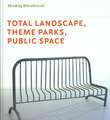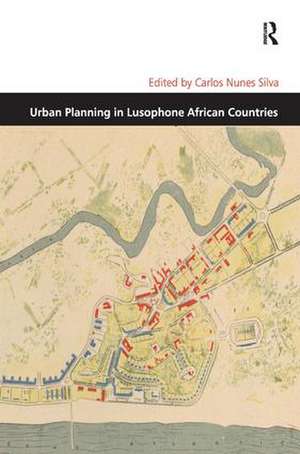Urban Planning in Lusophone African Countries: Design and the Built Environment
Autor Carlos Nunes Silvaen Limba Engleză Hardback – 18 sep 2015
| Toate formatele și edițiile | Preț | Express |
|---|---|---|
| Paperback (1) | 260.54 lei 6-8 săpt. | |
| Taylor & Francis – 14 oct 2024 | 260.54 lei 6-8 săpt. | |
| Hardback (1) | 769.07 lei 6-8 săpt. | |
| Taylor & Francis – 18 sep 2015 | 769.07 lei 6-8 săpt. |
Din seria Design and the Built Environment
-
 Preț: 340.37 lei
Preț: 340.37 lei - 18%
 Preț: 1027.58 lei
Preț: 1027.58 lei - 13%
 Preț: 338.33 lei
Preț: 338.33 lei -
 Preț: 492.20 lei
Preț: 492.20 lei - 14%
 Preț: 338.33 lei
Preț: 338.33 lei -
 Preț: 469.34 lei
Preț: 469.34 lei -
 Preț: 469.34 lei
Preț: 469.34 lei - 13%
 Preț: 338.33 lei
Preț: 338.33 lei -
 Preț: 471.42 lei
Preț: 471.42 lei -
 Preț: 349.15 lei
Preț: 349.15 lei -
 Preț: 489.26 lei
Preț: 489.26 lei -
 Preț: 469.34 lei
Preț: 469.34 lei - 14%
 Preț: 260.54 lei
Preț: 260.54 lei - 12%
 Preț: 301.97 lei
Preț: 301.97 lei - 15%
 Preț: 259.10 lei
Preț: 259.10 lei - 12%
 Preț: 328.00 lei
Preț: 328.00 lei - 25%
 Preț: 827.24 lei
Preț: 827.24 lei - 30%
 Preț: 768.79 lei
Preț: 768.79 lei -
 Preț: 389.31 lei
Preț: 389.31 lei - 18%
 Preț: 1006.43 lei
Preț: 1006.43 lei - 26%
 Preț: 876.36 lei
Preț: 876.36 lei -
 Preț: 382.91 lei
Preț: 382.91 lei -
 Preț: 416.22 lei
Preț: 416.22 lei - 17%
 Preț: 246.33 lei
Preț: 246.33 lei - 28%
 Preț: 800.60 lei
Preț: 800.60 lei
Preț: 769.07 lei
Preț vechi: 1105.63 lei
-30% Nou
Puncte Express: 1154
Preț estimativ în valută:
147.16€ • 154.06$ • 121.77£
147.16€ • 154.06$ • 121.77£
Carte tipărită la comandă
Livrare economică 05-19 aprilie
Preluare comenzi: 021 569.72.76
Specificații
ISBN-13: 9781472444875
ISBN-10: 1472444876
Pagini: 264
Ilustrații: Includes 31 b&w illustrations and 9 maps
Dimensiuni: 174 x 246 x 22 mm
Greutate: 0.72 kg
Ediția:New ed.
Editura: Taylor & Francis
Colecția Routledge
Seria Design and the Built Environment
Locul publicării:Oxford, United Kingdom
ISBN-10: 1472444876
Pagini: 264
Ilustrații: Includes 31 b&w illustrations and 9 maps
Dimensiuni: 174 x 246 x 22 mm
Greutate: 0.72 kg
Ediția:New ed.
Editura: Taylor & Francis
Colecția Routledge
Seria Design and the Built Environment
Locul publicării:Oxford, United Kingdom
Public țintă
AcademicNotă biografică
Carlos Nunes Silva, PhD, is Professor Auxiliar at the Institute of Geography and Spatial Planning, University of Lisbon, Portugal. His research interests are mainly focused on local government policies, history and theory of urban planning, urban and metropolitan governance, urban planning ethics, urban planning in Africa, research methods, local e-government, and urban e-planning.
Cuprins
Chapter 1 Introduction, Carlos NunesSilva; Part I Colonial Urban Planning in Lusophone African Countries; Chapter 2 Colonial Urban Planning in Lusophone African Countries, Carlos NunesSilva; Chapter 3 The City under the First Republic in the Former Portuguese Africa, Ana VazMilheiro; Chapter 4 Empire, Image and Power During the Estado Novo Period, AnaTostões, JessicaBonito; Chapter 5 The Plano de Urbanização da Cidade de Luanda by Étienne de Groër and David Moreira da Silva (1941–1943), TeresaMarat-Mendes, Mafalda Teixeirade Sampayo; Chapter 6 Modern Colonial, Inês LimaRodrigues; Chapter 7 The Prenda District in Luanda, FilipaFiúza, Ana VazMilheiro; Chapter 8 The Growth of Lourenço Marques at the Turn of the Nineteenth Century, Ana CristinaRoque; Chapter 9 A ‘High Degree of Civilization’, PedroPombo; Part II Postcolonial Urban Planning in Lusophone African Countries; Chapter 10 Postcolonial Urban Planning in Lusophone African Countries, Carlos NunesSilva; Chapter 11 Urban Planning in Angola in the Postcolonial Period, Carlos MiguelGuimarães, SofiaValente, Frederico CostaLeite; Chapter 12 Questioning the Urban Form, FabioVanin; Chapter 13 Postcolonial Transformation of the City of Maputo, David LeiteViana; Chapter 14 Mozambique’s Rescaled Dualistic Urbanisation, Céline F.Veríssimo; Chapter 15 The Re-emergence of Urban Renewal in Maputo, SílviaJorge; Chapter 16 Naming the Urban in Twentieth-Century Mozambique, TiagoCastela, Maria PaulaMeneses; Chapter 17 Prepaid Electricity in Maputo, Mozambique, IdalinaBaptista;
Recenzii
’Carlos Nunes Silva’s edited volume gives an account of urban planning in Lusophone African cities for an Anglophone readership for the first time. It thereby contributes to overcoming the linguistic barriers that constrain planning discourse and practice in Africa. This makes it an important book for those interested in comparing colonial planning legacies and understanding their on-going impact on Africa’s cities.’ Lindsay Bremner, University of Westminster, UK 'Have you ever wondered how history and culture shape current and future urban patterns and forms? Now you have a key reference with some good pointers and relevant answers from a range of well researched and rich experiences. This easy-to-read volume is a must for anyone aiming at understanding the urban planning legacies in Lusophone African countries and beyond. This publication will go down as one of the rare urban planning source books on Lusophone countries available to English-speaking audiences. In that way, it fills a huge language and scientific gap.' Remy Sietchiping, UN-Habitat, Nairobi, Kenya ’The thematic chapters of this important volume blaze a trail in many respects. It is the first major comprehensive text in English on colonial and post-colonial urban planning in Lusophone African countries. Together, the chapters do a marvellous job of interrogating the avowed and covert aims of colonial and contemporary urban planning in these countries. It is a must-read for anyone with an interest in modernist urban planning from historical and contemporary perspectives. The editor must be commended for assembling the respected team of scholars that contributed to the volume.’ Ambe Njoh, University of South Florida, USA
Descriere
Urban planning on the five Lusophone African countries, has so far been relatively overlooked in planning literature. This book fills the gap by providing an in-depth analysis of key issues in the history of urban planning and discussing the key challenges confronting contemporary urban planning in these countries. A team of leading scholars confirm previous research in the colonial and postcolonial periods in Lusophone African countries and at the same time break fresh ground and offer additional insights.
